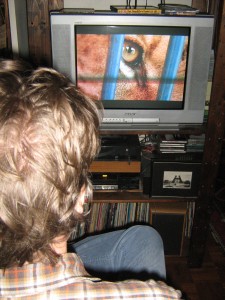Because I have lists on the brain, here’s another: films that have had a huge impact on me in general, and on A Life’s Work in particular.

Grey Gardens
The first time I saw the Maysles’ Grey Gardens it made me very very uncomfortable. I thought I was watching the exploitation of a couple of mentally ill people. I saw it again many years later, when I had older, failing and frail parents, and I thought I was watching a complicated love story. When I saw it a few years after that I thought I was watching a portrait of a couple of great American eccentrics. That Grey Gardens keeps drawing me back in and changing my idea of what I’m seeing is remarkable, but at its core this film makes the viewer ask what is “normal” behavior? What is “acceptable” behavior? I don’t think the subjects in A Life’s Work are anything like Big or Little Edie, but I’m hoping the viewers of A Life’s Work will look at the subjects and wonder what makes them tick in the same way one looks at the Beales.
For All Mankind
As I mentioned in earlier post (What Was I Thinking?), I had this idea of eliminating all talking heads and having only the subjects’ voices over images of them working or going about the stuff of their day. Seeing this film reinforced this idea. Okay, so it wasn’t a good idea for A Life’s Work, but it worked brilliantly Al Reinert’s For All Mankind. I wrote more extensively in a previous post why For All Mankind is important to me, so I won’t get into it again. Giant thanks to Andy Bowley for telling me about this film not all that long ago.
Antonio Gaudi
Shooting architecture, especially big architecture, is tricky, but Hiroshi Teshigahara nailed it. Here, the no talking heads idea is taken to the extreme. In fact, except for some bit of dialog at the end, there is no narration at all, only images of Antonio Gaudi’s architecture shot in a most meditative style. This film became a reference for the way we shot Arcosanti, though we didn’t have the luxury of a dolly, and even if we had, setting it up would have been quite a challenge. The architecture does all the talking in Gaudi, and does all the talking for Gaudi. I liked that idea and hoped we could pull it off when we shot Arcosanti. Did we?
Fast, Cheap, and Out of Control
The similarities here are obvious, and when people compare A Life’s Work to this film, I don’t mind at all, and instead take it as a compliment, because I think this is a great great film and Errol Morris is a great great filmmaker. When I speak about A Life’s Work for the first time to someone I often ask if they’ve seen Fast, Cheap, and Out of Control right off the bat, because then they can get an idea of the structure of the film, of the cross cutting, of the selection of four seemingly very different people doing four seemingly very different things. But A Life’s Work is much different than Fast, Cheap, and Out of Control. For one thing, I don’t share Erroll Morris’ passion for re-enactments and the eccentric. They work in his film magnificently, but they’re not for me. I love verite and the every day. The subjects in A Life’s Work are really doing very ordinary things–looking at the sky and wondering what’s up there, nurturing botanicals, trying to build efficient shelter, trying to pass down a vital piece of culture to future generations. They are just doing it on an out-sized scale and operating on a time scale that extends beyond their lives.
Werner Herzog
Okay, I know Werner Herzog isn’t a film, but it is because so much of his oeuvre is uncompromising and that he is not afraid to tackle the big themes that he is an inspiration and influence. Go to the South Pole? No problem. The Amazon? You bet. Burning oil fields? Bags are packed! I wish I had one-hundredth of the fearlessness this man has. And to me, that’s what makes him an exciting filmmaker. His willingness to take risks and ask the big questions, even if it means putting himself (and others, can’t get behind that, Werner, sorry) in peril. That he’s more interested in people than the gee-whiz technology of cinema endears him to me further.
Special Mention: The Seven Up series.
Michael Apted was one of the people I considered approaching for A Life’s Work, but the thought of getting all meta or getting in the way of his work dissuaded me from this idea quickly. But it’s remarkable to watch these films and see where these people go in life. I know some people have given up on the series, but I recommend taking it up again, and if you’re watching them on DVD, it’s worth your while to listen to Apted’s commentary on 42 Up.
Have a comment about this list? Or maybe you feel like sharing your own? Go ahead. Make my day!
